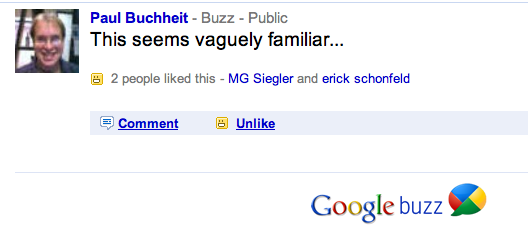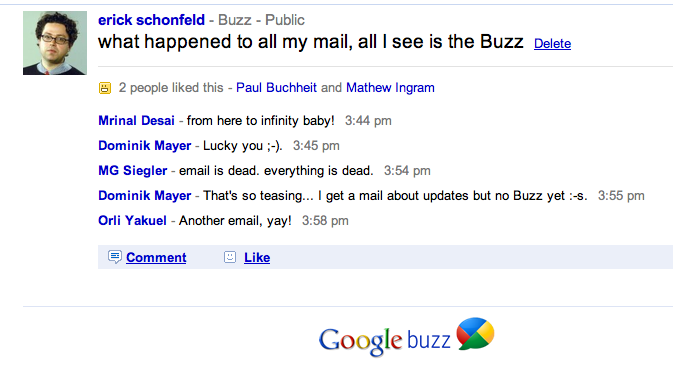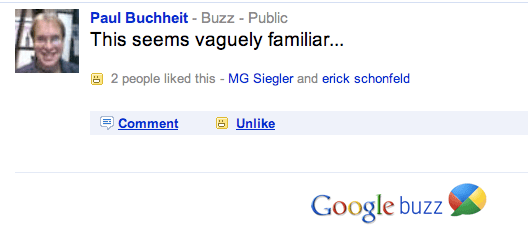
As soon as Google Buzz was released earlier today, all the early adopters piled in to give it a spin. Paul Buchheit, the creator of Gmail and a founder of FreindFeed, was among them and his initial reaction was: “This seems vaguely familiar . . .” Or, as he put it elsewhere, “There’s a FriendFeed in my Gmail. Sweet! :) ”
It is vaguely familiar to him on various levels. Like FriendFeed before it (which was acquired by Facebook), Buzz acts as a way to bring together different social streams together—Twitter, Flickr, Picasa, Google Reader shared items, status updates, shared links and videos. It presents them all in a single stream from everyone you follow from you Gmail contacts. Each item can be commented on, “liked,” or taken into a private email or chat conversation. You end up getting comment strings around a single shared link, photo, or video, just like on FriendFeed, except FriendFeed can import items from many more social websites. (Although FriendFeed is not enabled as a connected site for most users, strangely enough it is enabled for Buchheit’s account.).

But the other reason Buzz is vaguely familiar to Buchheit is because it lives right inside Gmail, which he launched when he was a Google engineer. It appears right under your “Inbox” link, and takes over the entire window where your 10,000 unread emails usually stare you in the face. It replaces it with a living, breathing, never-ending social commentary. My first reaction when I saw Buzz was to wonder what happened to all my mail. I didn’t miss it.
Unlike Google Wave, which lives in its own silo, the fact that Buzz is a feature of Gmail makes me want to use it, despite it’s deficiencies. Right now, Buzz only consumes communications from outside Google in a one-way fashion. You can see other people’s Tweets, for instance, but you can’t Tweet back to them. And those Tweets definitely don’t come in realtime either. There is a noticeable lag.
Buchheit agrees. When I asked him via email how he feels about Google channeling him, he responded: “It seems nice. Integrating into Gmail is the right way to go. It’ll be interesting to see how much activity it gets.” The fact that I was sable to gather his thoughts from Buzz, FriendFeed, Twitter, and Gmail speaks to the disjointed nature of our communications. Back in November, I had the opportunity to interview Buchheit on stage on whether he thought that email is dead. He defended email and admitted he had not yet tried Google Wave. But he’s already jumped into Buzz.
The question is not really where email is dead, but whether it will continue to be the primary form of electronic communication, or merely recede to the background as convenient dumping ground for archiving our realtime conversations. Whether Buzz puts more people at ease with using a realtime communication mode as their primary communication mode remains to be proven. But it points towards the inevitable direction that all Web communications are taking: more realtime, intermingled, disjointed, and multimedia.

